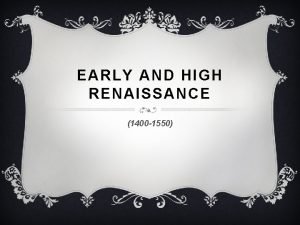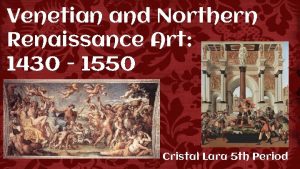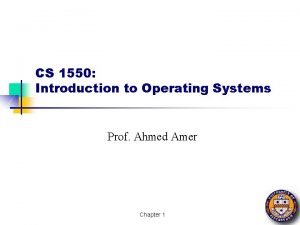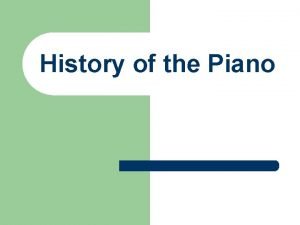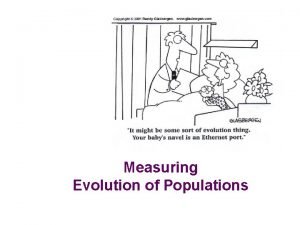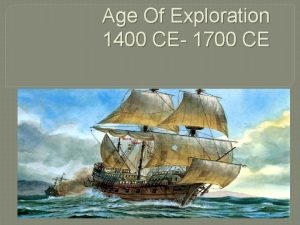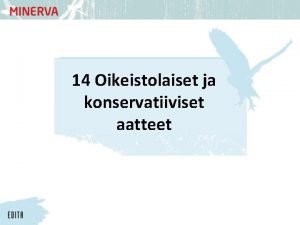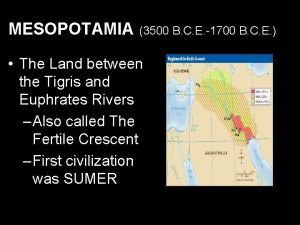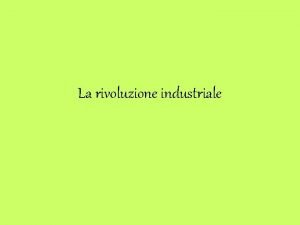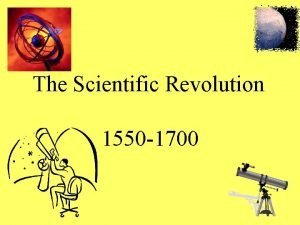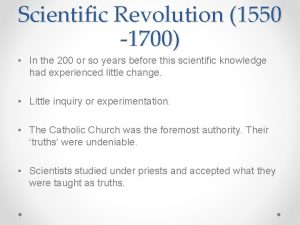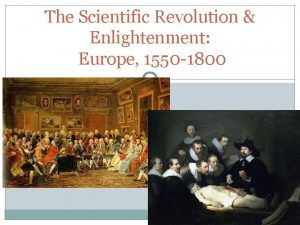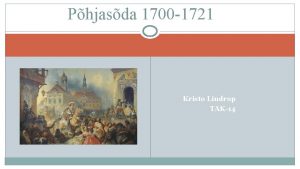From 1550 to 1700 Europe experienced a Scientific

















- Slides: 17

From 1550 to 1700, Europe experienced a Scientific Revolution when new ideas in physics, astronomy, biology, and anatomy changed the way Europeans viewed the natural world

Everything was questioned & nothing was assumed to be true Thinkers used logic & the scientific method to find answers to questions

Nicolaus Copernicus ■ Copernicus’ heliocentric theory proposed that the sun is the center of the universe, not the earth –This radically changed Europe’s concept of the universe & laid the foundation for modern astronomy

Johannes Kepler ■ Johannes Kepler mathematically proved Copernicus’ heliocentric theory & proposed that planets move in elliptical orbits & do not always travel at same speed around the sun

Galileo Galilei Galileo adapted the telescope to be able to see farther into the universe than ever before. For the first time, scientists could SEE the truth in Copernicus’s and Kepler’s theories.

Galileo Galilei ■ Galileo was one of the most ■ influential scientists ever: ■ Galileo’s works challenged what the church was teaching. ■ He was arrested by the church and forced to recant his findings.

Isaac Newton ■ Isaac Newton created many scientific breakthroughs in physics: –Discovered & explained theory of gravity –He studied the physics of motion, light, & heat –Created calculus to prove his theories

From 1650 to 1800, European philosophers began rethinking old ideas about gov’t, religion, economics which led to an era known as the Enlightenment (also called the Age of Reason)

The intellectuals of the Enlightenment were called The Enlightenment philosophes & they shared some basic beliefs New truths could be Everything could be explained discovered by using by observing universal truths logic & reason known as natural laws People are born with natural rights (personal freedoms that protect liberty)

The most important Enlightenment ideas were those that challenged rule by absolute monarchs & presented new theories about government

Political Ideas of the Enlightenment One of the first political thinkers of the Enlightenment was Thomas Hobbes believed that humans are naturally cruel, selfish, & hungry for power; Hobbes argued that people need to be protected from themselves

Political Ideas of the Enlightenment Hobbes supported rule b y absolute monarchs; He used scientific reasoning to argue that only kings with absolute power could maintain order in society Hobbes believed in an idea called the social contract: people give up power & rights to a king who provides law & order

Political Ideas of the Enlightenment English philosophe John Locke disagreed with the ideas of Thomas Hobbes Locke believed that people are born with natural rights, including life, liberty, property; Locke argued that kings could be overthrown if they violated peoples’ rights

Political Ideas of the Enlightenment Locke supported limited or constitutional monarchies Locke believed that gov’t power came from the consent of the governed (approval of the people) & that kings should protect the rights of the people The English Bill of Rights (1689) • The king cannot tax or overturn Parliament’s laws • Protected freedom of speech • The army cannot be used as a police force • No excessive bail

Political Ideas of the Enlightenment The French philosophe Voltaire was one of the most famous writers of the Enlightenment Voltaire argued for the rights of freedom of speech & religion; He criticized intolerance, prejudice, & oppression Voltaire was jailed twice in France for criticizing the gov’t but his letters to European monarchs helped introduce new reforms & freedoms

Political Ideas of the Enlightenment The Swiss philosophe Jean-Jacques Rousseau believed in individual freedom Rousseau believed that people are naturally good, but power corrupts them Rousseau argued for a direct democracy that is guided by the general will of the majority of citizens

Quick Writing Prompt: Do you agree with Voltaire? Voltaire once said: “I may disapprove of what you say, but I will defend to the death your right to say it. ” When, if ever, should freedom of speech be restricted? Consider schools, TV, radio, wartime, etc.
 Tlm 1550
Tlm 1550 Antimonio alquimia
Antimonio alquimia Early and high renaissance (1400–1550)
Early and high renaissance (1400–1550) Venetian and northern renaissance (1430–1550)
Venetian and northern renaissance (1430–1550) Cs 1550
Cs 1550 1700 piano
1700 piano Rivoluzione agricola 1700
Rivoluzione agricola 1700 Request mast
Request mast 1 in 1700 us caucasian newborns have cystic fibrosis
1 in 1700 us caucasian newborns have cystic fibrosis 1700 ce
1700 ce 1700 luvun aatesuunta
1700 luvun aatesuunta Lexile framework for reading
Lexile framework for reading Cisco aironet 2800 設定
Cisco aironet 2800 設定 3500 bce
3500 bce Puritan age in english literature
Puritan age in english literature Rotazione quadriennale rivoluzione industriale
Rotazione quadriennale rivoluzione industriale Eric weiner fdny
Eric weiner fdny 1700 bce
1700 bce


